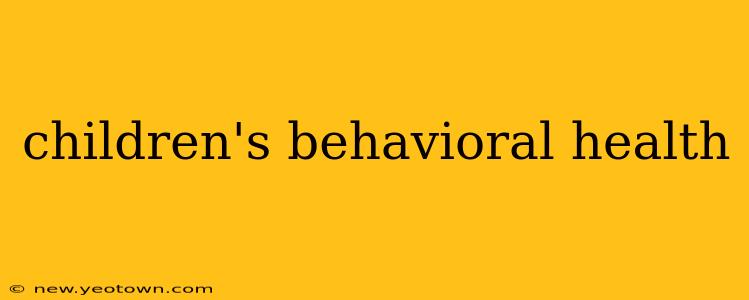The journey of parenthood is filled with joy, challenges, and countless moments of learning. One aspect that often requires extra attention and understanding is children's behavioral health. It's a broad topic encompassing everything from minor tantrums to more complex conditions requiring professional intervention. This guide aims to shed light on this vital area, offering insights and resources for parents navigating the complexities of their child's emotional and behavioral well-being.
What is Children's Behavioral Health?
Children's behavioral health focuses on the emotional, social, and psychological well-being of children and adolescents. It's not just about addressing problematic behaviors; it's about fostering healthy development and equipping young ones with the tools they need to thrive. This encompasses a wide spectrum, from typical childhood challenges like sleep difficulties or picky eating to more significant issues like anxiety, depression, ADHD, or oppositional defiant disorder. Think of it as a holistic approach to understanding and supporting your child's overall mental wellness.
What are Common Behavioral Issues in Children?
Many behavioral challenges are a normal part of child development. However, knowing when to seek professional help can be crucial. Some common issues include:
- Tantrums and Meltdowns: While temper tantrums are common in toddlers and preschoolers, excessive or unusually intense tantrums might signal an underlying issue.
- Aggression: Physical or verbal aggression towards others or self-harm can be a serious concern.
- Anxiety and Fear: Excessive worry, separation anxiety, or phobias can significantly impact a child's daily life.
- Depression: Symptoms such as persistent sadness, loss of interest, and changes in sleep or appetite can indicate depression in children.
- Attention-Deficit/Hyperactivity Disorder (ADHD): ADHD is characterized by inattention, hyperactivity, and impulsivity.
- Oppositional Defiant Disorder (ODD): Children with ODD frequently defy authority figures, argue, and exhibit angry outbursts.
- Autism Spectrum Disorder (ASD): ASD is a neurodevelopmental condition affecting communication, social interaction, and behavior.
How Can I Tell if My Child Needs Professional Help?
Determining whether your child needs professional help can be challenging. Consider these factors:
- Severity and Frequency: How severe are the behaviors? How often do they occur? Are they interfering with daily life, school, or relationships?
- Duration: How long have these behaviors been present? Persistent issues often warrant professional evaluation.
- Impact on Functioning: Are the behaviors impacting your child's ability to learn, socialize, or participate in daily activities?
- Your Gut Feeling: Trust your intuition. If something feels off, don't hesitate to seek professional guidance.
What are the Different Types of Treatment Available for Children's Behavioral Health Issues?
Treatment options vary depending on the specific diagnosis and the child's individual needs. Common approaches include:
- Therapy: Individual, family, or group therapy can help children learn coping mechanisms, develop healthy communication skills, and address underlying emotional issues.
- Medication: In some cases, medication may be recommended to manage symptoms, particularly for conditions like ADHD or anxiety. This is always done in consultation with a psychiatrist or other qualified medical professional.
- Behavioral Interventions: Techniques like positive reinforcement and behavior modification can help shape positive behaviors and reduce problematic ones.
What are the Signs of a Mental Health Crisis in Children?
Recognizing the signs of a mental health crisis is crucial for ensuring timely intervention. These may include:
- Suicidal thoughts or behaviors: Any mention of self-harm or suicide requires immediate professional help.
- Self-harm: Cutting, burning, or other forms of self-injury.
- Extreme changes in behavior: Sudden shifts in mood, personality, or sleep patterns.
- Severe anxiety or panic attacks: Intense fear or anxiety that interferes with daily functioning.
- Psychosis: Experiencing hallucinations or delusions.
Where Can I Find Resources and Support for My Child's Behavioral Health?
Seeking support is a sign of strength, not weakness. Numerous resources are available to help families navigate challenges in children's behavioral health:
- Pediatrician or Family Doctor: Your primary care provider can offer guidance and refer you to specialists.
- Child Psychologist or Psychiatrist: These professionals can diagnose and treat behavioral health issues.
- Therapists and Counselors: Various therapists specialize in working with children and adolescents.
- Support Groups: Connecting with other parents facing similar challenges can be incredibly beneficial.
- Online Resources: Numerous websites and organizations provide information and support.
Navigating the world of children's behavioral health can feel overwhelming, but remember you're not alone. Seeking help is a sign of strength, and with the right support, your child can thrive and reach their full potential. Remember to always consult with qualified professionals for personalized guidance and treatment plans.

